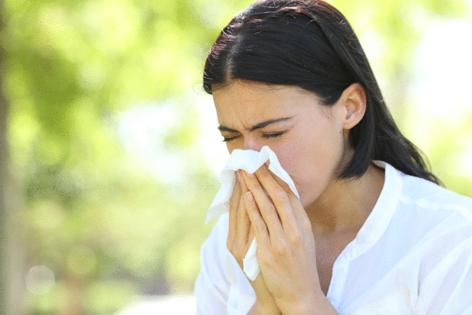Lisa Jarvis: You're not imagining it. Your allergies are getting worse
Published in Lifestyles
If you’ve sensed that your allergies are getting worse each year, it’s not your imagination: Allergy season in the U.S. is getting longer and more intense. You can thank climate change for your misery. And yet we’re not doing enough — to slow down climate change, of course, but to recognize and respond to its very clear health effects.
These weigh on the economy, too. Estimates for direct costs, for things like antihistamines and inhalers, and indirect ones, for office absences or lower productivity, range in the billions of dollars. And while much of the research stems from an era when better allergy meds were just being introduced, one more recent study out of Sweden found that was costing the country of 9.5 million people upwards of 1.3 billion euros per year.
Allergies are a prime example of a common condition getting worse because of a warmer world. “When you turn up the temperatures on plants, especially in a controlled setting like a greenhouse, or you increase carbon dioxide concentrations, plants put out quite a bit more pollen,” explains William Anderegg, director of the Wilkes Center for Climate Science and Policy at the University of Utah.
Anderegg conducted an oft-cited study of pollen trends that found seasons now start 20 days earlier than they did in 1990, and last about 8 days longer. Meanwhile, there’s about 20% more pollen filling the air. Much of that shift is due to climate change.
“Pollen is a really clear example of how climate change is with us here and now, in our backyards and already affecting our health,” he says.
That could have real ramifications for the quarter of adults and nearly 20% of children in the U.S. with seasonal allergies. They will be wheezier and sneezier for more of the year. And they might be caught unprepared when allergens appear earlier than expected (to be most effective, allergy medicine should be taken before exposure).
When the lungs are aggravated by pollen, it can make people more vulnerable to certain illnesses, like the common cold and sinus infections. And it’s downright dangerous for people with asthma: An analysis of asthma patients Maryland found that very early-onset spring led to a 17% increase in hospitalizations.
As the climate worsens, so too could pollen’s health effects. A 2019 study found that tree and grass pollen combined were responsible for some 35,000 to 60,000 emergency room visits each year, many of those cases in children. The researchers predicted climate change could push those numbers up by 14% by 2090, with grass pollen becoming a bigger problem, particularly in the Northeast, Midwest and Southern Great Plains regions.
Many more people could eventually be living in allergy misery. Each of us has an individual pollen threshold, above which the immune system is triggered and allergy symptoms appear, explains Kenneth Mendez, CEO and President of the Asthma and Allergy Foundation of America. A more intense pollen season will make someone with a lower threshold feel worse, and could tip people with higher thresholds into the ranks of allergy sufferers.
People with seasonal allergies should stay on top of their symptoms by starting their meds at the first signs of spring — even if those occur in February. Antihistamines need to be taken regularly for about two weeks before pollen season starts to be effective, Mendez says. If over-the-counter medicines seem to have lost their punch, see a specialist, who might recommend allergy shots.
...continued
©2024 Bloomberg L.P. Visit bloomberg.com/opinion. Distributed by Tribune Content Agency, LLC.







Comments